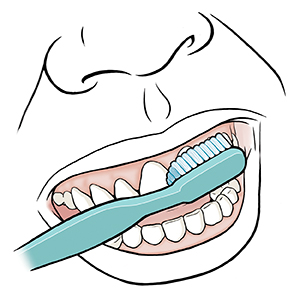Dental Implants: After Surgery
You just had dental implant surgery. Read on to learn what to expect after surgery, how to recover at home, and all mouth care instructions. Keep all follow-up appointments with your surgeon and dentist.
After surgery
When your surgery is over, you may rest awhile. But you can go home as soon as you feel able. Be aware that a certain amount of swelling and minor bleeding is normal. To speed your recovery, follow your surgeon’s instructions. You may be told to:
-
Drink only clear liquids for the rest of the day
-
Take pain medicines and antibiotics as prescribed
-
Not put pressure on your jaw
-
Eat soft foods for the first few days as your mouth begins to heal
-
Not wear your temporary prosthesis or denture for a certain amount of time as directed
Taking care of your mouth
Much of the healing process depends on keeping your teeth and gums clean. You may get an infection if your mouth is not kept clean as you have been instructed. This could cause the implants to fail. For best results:
-
Use a soft toothbrush to clean your teeth and gums after every meal.
-
Clean the areas near your incisions as directed by your surgeon. But don't brush the incisions themselves. Ask when you can start brushing normally again.
-
Use an antimicrobial mouth rinse if prescribed.

Follow-up care
It often takes a few months for the jawbone to firmly attach to implants. During that time, you’ll have several follow-up visits with your surgeon. This is to see how well your jaw is healing. If you wear a denture, you may also visit your restorative dentist. They may put a new lining in your denture for greater comfort.
When to get medical care
Call your surgeon or get medical care right away if you have any of the following:
-
A large amount of swelling under the tongue, or around the face and neck
-
Bleeding that won’t stop
-
Pain in the jaws, mouth, or sinuses that isn’t relieved by prescribed medicine
-
A fever of 100.4º F ( 38ºC) or higher, or as directed by your surgeon
-
Numbness that doesn't go away after the anesthesia wears off
© 2000-2024 The StayWell Company, LLC. All rights reserved. This information is not intended as a substitute for professional medical care. Always follow your healthcare professional's instructions.